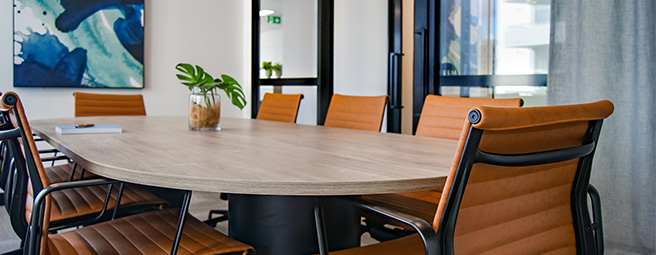
How Far in Advance Should You Book a Meeting Space?
How far in advance do you have to book a meeting space? Whether you’re booking a meeting for employees or with clients, such requires appropriate preparation. The very fact that a large percentage of professionals feel meetings are a waste of time should be a shot across the bow. Research confirms these “feelings” are actually scientific.
Counting: 55 Million Meetings a Day, Over Half of Them Fail
University of North Carolina Charlotte Management Professor Steven Rogelberg conducted scientific research on the subject of meetings and published the findings in an award-winning book—The Surprising Science of Meetings: How You Can Lead Your Team to Peak Performance. In the book, he notes that on any given day there are around 55 million meetings, and that roughly 50 percent of the time spent in a meeting is worthwhile. Ironically, in the polling of professionals coming out of a meeting, the one individual who normally feels the meeting went well is the organizer; the majority of the others are quite frustrated with meetings they attend.
Rogelberg cites a number of different reasons as to why meetings go poorly. Anyone who is involved in planning and managing meetings needs to purchase a copy of his book. As to the question of how far in advance one needs to book a meeting space and plan a meeting, the answer is that “it depends” on meeting. Everything from the type of meeting, to meeting attendees, to meeting outcomes are determining factors.
Determining What Type of Meeting Room Space
While nearly all meetings are virtual right now during COVID-19 shelter-in-place mandates, the day will arrive when in-person meetings are possible again—and thus booking a meeting space (at least for most of the participants) will be important again. For small businesses without a physical office, this translates into several options: 1) local coffee shop, 2) hotel meeting space, or 3) a rented meeting room space.
For the first option, coffee shops are noisy, lack privacy, and do not come with the presentation and collaboration tools required for a successful meeting. In the case of hotel meeting space, it is expensive (often twice as much as a rented meeting room) and often does not come with the right presentation and collaboration tools. Rented meeting rooms, which are very often part of a shared workspace environment, are affordable and can be rented for hourly, half-day, and daily increments. They also provide a high degree of privacy and come with state-of-the-art presentation and collaboration tools.
Even small businesses with permanent office spaces that have one or more conference rooms may want to consider renting a meeting space for some of their meetings. There are myriad reasons such as needing a larger space or seeking a more professional, quiet, and/or private setting.
Reviewing Pre-meeting Room Recommendations
Following are pre-meeting recommendations that meeting organizers need to follow in order to ensure their meetings are set up for success, including their meeting rooms:
-
Determine the Meeting Type.
There are a lot of different meeting types. The type of meeting room you need to find and book is partially determined by meeting type:
- Prospect/Sales Meeting
- Customer Meeting
- Status Update
- Information Sharing
- Decision Making
- Problem Solving
- Innovation
- Team Building
-
Identify the Right Participants.
Ironically, while many contend the meetings that they attend are a waste of time, most will attend meetings if invited. They also get bent out of shape if they suddenly aren’t invited to attend meetings. Organizers need to ensure everyone attending the meeting understands their roles and responsibilities. A great model for doing so is RACI (responsible, approver, contributor, informed) or DACI (decision-maker, approver, contributor, informed). Knowing the number of attendees enables an organizer to know how many will be attending and what size of room to book and what size of orders to place for food and beverages. -
Identify and Communicate Meeting Purpose and Agenda.
Those attending a meeting need to know its purpose and agenda beforehand. Failing to communicate such beforehand is a sure-fire way to fail. Meeting purpose and agenda impacts the type of meeting room that needs to be booked. For example, if lunch needs to be served and the rented meeting room provider does to provide catering, then it may not be a good option. Or, if administrative support is needed during the meeting (e.g., faxing, making photocopies, etc.), then a rented meeting room facility that lacks those capabilities should also be struck from the list. -
Confirming Meeting Logistics Roles.
In addition to using a DACI/RACI model for assigning roles, a meeting organizer needs to think in terms of logistical roles such as moderator, secretary, and timekeeper. A moderator is important because they need to keep everything on track, resolve disagreements, get things going when the discussion gets stuck, and chart next steps and actions. Secretary needs to scribe the minutes of the meeting, and the timekeeper ensures there is enough time to cover every topic by monitoring the clock against the number of items on the agenda. -
Assign Prep Time.
Pre-meeting assignments are not applicable for all meetings. But for some they can help facilitate discussion, creativity, and engagement. Examples of meetings where prep work can lead to a much more effective meeting include assignments to review a proposal and prepare a list of questions and comments (the proposal or draft is sent out ahead of time), or a project status review where attendees are given a project calendar and status on deliverables and due dates. These assignments may dictate certain requirements for the meeting room such as break-out sessions or the need to use day offices in some cases. Each of these need to be supported by the rented meeting room provider.
Booking a Meeting Room in Advance
With the above information in hand, a meeting organizer can locate and book a meeting room that matches each of the aforementioned requirements. Organizers need to look for solutions that are easy to vet and book. As most professionals are constantly on the go, a booking experience that spans multiple channels is ideal—phone, web, text, live web chat, and mobile apps. In the case they run into a problem, organizers need to be able to seamlessly move between the different engagement channels. They also need to be able to view meeting room dimensions and available presentation and collaboration tools as well as confirm administrative services, parking logistics, and more.
When booking a meeting room, organizers should not wait to the last minute. Once the meeting type, meeting purpose, number of attendees, and other requirements have been determined, organizers need to vet their different options and book the one that is most suitable to their needs. This normally means doing so several weeks in advance.
Davinci Meeting Rooms provides all of the aforementioned options as well as the capability to vet and book meeting rooms far in advance. And while a professional meeting room is not a guarantee that a meeting will be a success, it is a really important starting point.

Categories
Subscribe to Our Blog
Archive

- April 2025
- March 2025
- February 2025
- January 2025
- December 2024
- November 2024
- October 2024
- September 2024
- August 2024
- July 2024
- June 2024
- May 2024
- April 2024
- March 2024
- February 2024
- January 2024
- December 2023
- November 2023
- October 2023
- September 2023
- August 2023
- July 2023
- June 2023
- May 2023
- April 2023
- March 2023
- February 2023
- January 2023
- December 2022
- November 2022
- October 2022
- September 2022
- August 2022
- July 2022
- June 2022
- May 2022
- April 2022
- March 2022
- February 2022
- January 2022
- December 2021
- November 2021
- October 2021
- September 2021
- August 2021
- July 2021
- June 2021
- May 2021
- April 2021
- March 2021
- February 2021
- January 2021
- December 2020
- November 2020
- October 2020
- September 2020
- August 2020
- July 2020
- June 2020
- May 2020
- April 2020
- March 2020
- February 2020
- January 2020
- December 2019
- November 2019
- October 2019
- September 2019
- August 2019
- July 2019
- June 2019
- May 2019
- April 2019
- March 2019
- February 2019
- January 2019
- December 2018
- November 2018
- October 2018
- September 2018
- August 2018
- July 2018
- June 2018
- May 2018
- April 2018
- March 2018
- February 2018
- January 2018
- December 2017
- September 2017
- June 2017
- April 2017
- October 2016
- July 2016
- May 2016
- April 2016
- February 2016
- November 2015
- September 2015
- February 2015
- January 2015
- December 2014
- November 2014
- October 2014
- August 2014
- July 2014
- July 2013
- May 2013
- February 2013
- December 2012
Talk to an expert
Want help finding the ideal meeting room? Give us a call
Book the Perfect Meeting Room Now
Find a Meeting Room








